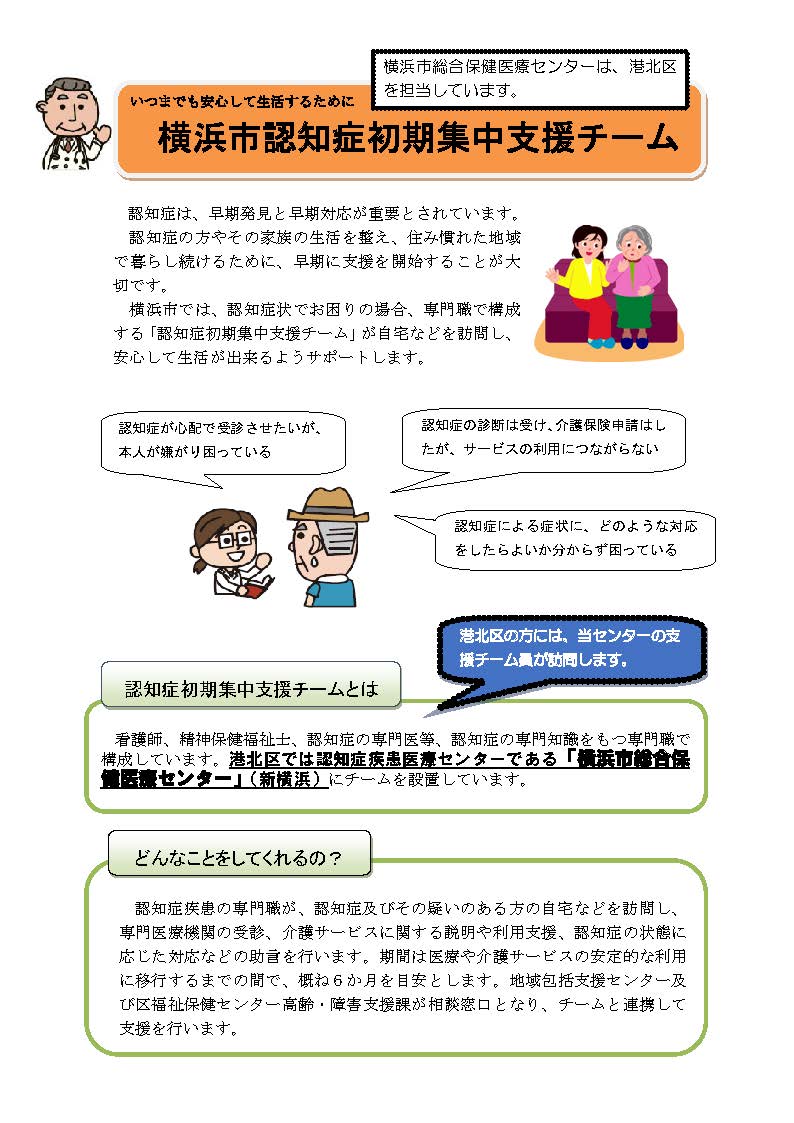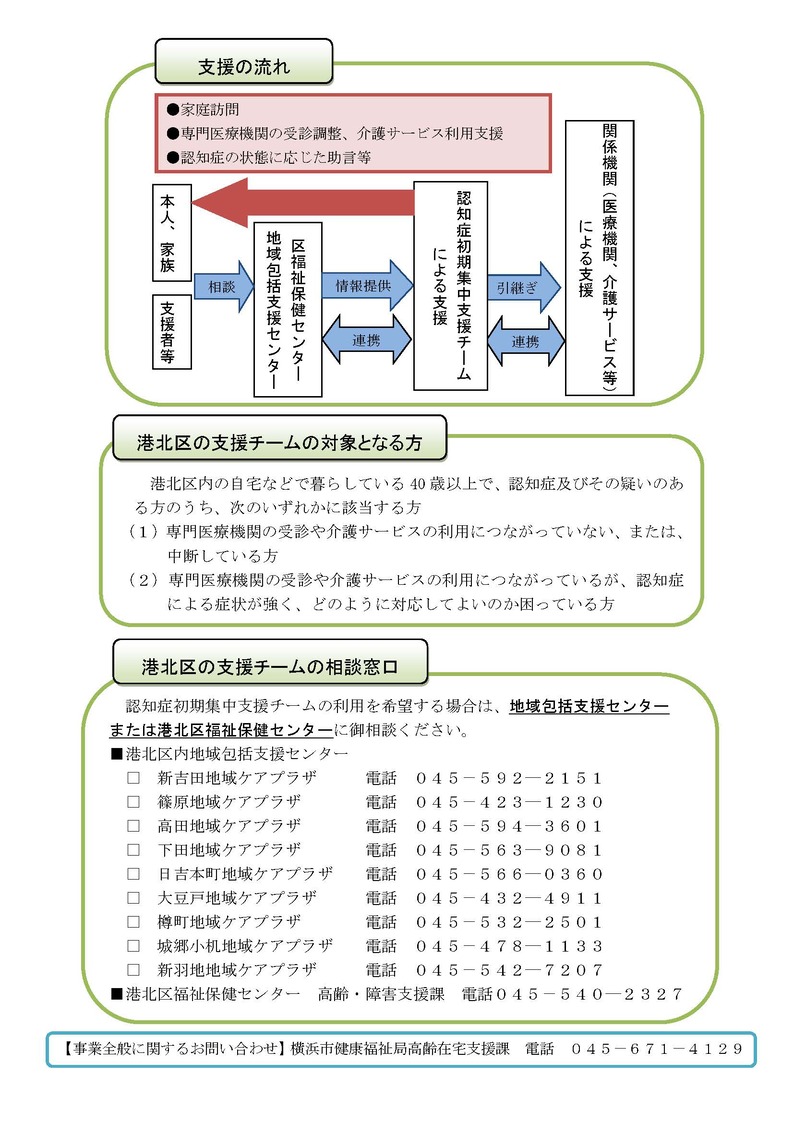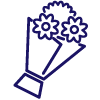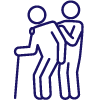- Yokohama-shi Top Page
- Kohoku Ward Top Page
- Health, Medical and Welfare
- Welfare and nursing care
- Welfare and Nursing Care for the Elderly
- Efforts on Dementia
- Support for people with dementia and their families
Here's the text.
Support for people with dementia and their families
Kohoku Ward aims to create a city where people with dementia and their families can live with peace of mind in a familiar area.
Last Updated May 10, 2024
Let's learn about the disease of dementia
Dementia is a brain disease.
Dementia is a disease that anyone can get. Dementia refers to a condition in which brain cells die due to various diseases, or poor work causes various disorders, which hinders living (continue for more than 6 months). You. The higher the age, the more likely it is to develop.
It is said that the incidence of the disease increases from the age of 65 and over, and that one in four people develops the disease over the age of 85. There is also juvenile dementia that occurs in young people under the age of 65. Juvenile dementia refers to those who develop under the age of 64 and are still under the age of 64. Because it develops in the prime of work, it is not possible to do enough work and housework, and it is greatly affected not only the person himself, but also the work and family, causing various problems.
There are various types of dementia.
The brain has its own role in each part. There are various parts, such as the part that plays the sensation of seeing and listening, the part that performs the exercise, and the part that carries the memory. There are various types of dementia, depending on where the brain was damaged.
Type of Dementia
Oh Alzheimer's dementia
As the protein called β (beta) amyloid accumulates in the brain over a long period of 20 or 30 years, the function of brain cells is gradually lost, the brain is contracted and the function is generally reduced. You. The progression is slow, but the symptoms vary as the whole brain shrinks. I have the most common dementia.
Oh Cerebrovascular dementia
It is a dementia in which nutrients and oxygen are not distributed to nerve cells due to cerebral infarction, cerebral hemorrhage, cerebral arteriosclerosis, etc., resulting in the death of nerve cells in that part and the network of nerves is broken. There are two types: those that suddenly develop and progress step-by-step, and those that develop gently and gradually progress. Symptoms vary depending on the part of the damaged brain.
Oh Lewy body type dementia
It is caused by atrophy and temporal lobe of the brain, and the age of onset tends to be younger. It is characterized by an increase in anti-social behavior, such as being unable to stand still, getting angry, and taking selfish actions that do not fit on the spot (such as pick disease).
Oh Others
There are various causes of dementia. Vitamin deficiency caused by lack of vitamins and hypoglycemia with too low blood sugar can also cause dementia, and some dementia comes from alcoholism and drug dependence. In addition, there are dementia that can be diagnosed early, such as chronic subdural hematoma and normal pressure hydrocephaly, and may be cured by appropriate treatment such as surgery. Some diseases, such as depression, can cause symptoms that are likely to be mistaken for dementia.
(Note) Not all people with brain disabilities have dementia.
Diagnosis and treatment of dementia
Oh It may be cured or temporary symptoms.
In the case of normal pressure hydrocephalycephaly, brain tumors, chronic subdural hematomas, cerebral surgery may be better. In the case of thyroid hormone abnormalities, medical treatment improves. If you experience dementia-like symptoms due to improper use of the medicine, stop or adjust the medicine to recover. However, if left unchecked for a long period of time, brain cells may die or become permanent dysfunction, resulting in recovery or impossible. It is important to have a medical examination as soon as possible.
Oh Benefits of having an early consultation
Even if you have minor memory impairments, if you take appropriate measures while you can live your basic daily life, you may be able to delay the onset or reduce the symptoms lightly. In Alzheimer's dementia, drugs can slow the progress, and if you start using it early, you can keep a healthy time for a long time. If you obtain information on a guardian (voluntary guardianship system) when the symptoms become severe while the symptoms are mild and provide information on services that support daily life and prepare and arrange early, you will live your own way of life even if you have dementia Can be fulfilled.
In addition, family members and people around them will not panic even if their symptoms become severe, and will be able to respond according to their situation. Doing so also leads to calming the symptoms early without confusing yourself.
Don't miss a little unusual sign.
Oh First, let's talk to your GP.
To distinguish the cause of the disease, it is also necessary to hear from the person and his family about daily changes, such as changes in daily life and when they happened. If you think "something is strange compared to before", it is important to first consult your GP and consult a specialized medical institution that can provide a differential diagnosis if necessary.
As a result of the diagnosis, even if there is nothing, get regular health checks such as physical checkup.
What can be done to prevent the progression of dementia
The secret to keeping a healthy brain lies in your daily care.
Oh Point 1: Reduce the risk of onset
Alzheimer's disease and cerebrovascular dementia are associated with lifestyle-related diseases (high blood pressure, diabetes, dyslipidemia, etc.). It has been found that daily life management will lead to the prevention of dementia, such as trying to eat abundant vegetables, fruits, and seafood, and acquiring regular exercise habits.
Oh Point 2: Activate the brain
The important thing is to keep doing it happily with your family and friends.
・Let's play a role in hobbies, work, home and community.
・Let's take care of each other.
(Example) Go, mahjong, reading aloud, calculation, etc.
Source: Yokohama City Dementia Supporter Training Course Text (Edited / Issued NPO Citizen Sector Yokohama Social Welfare Corporation Yokohama City Japan National Council of Social Welfare, City of Yokohama, Health and Social Welfare Bureau Elderly Home Support Division)
How to consult
For comprehensive consultation, go to the ward office and the community care plaza.
Professionals provide a variety of consultations, including information on The Long-term Care Insurance and medical institutions. Please feel free to contact us.
Various consultations can be made, such as concerns, problems, and concerns about dementia.
Introduction to Kohoku Ward Community Care Plaza
・Kohoku Ward Office Elderly and Disabled Support Division Senior Citizen Support Section (11th floor on the first floor) Phone number: 045-540-2327 FAX: 045-540-2396
Forgetfulness consultation
A psychiatrist is available once a month at the ward office for those who are worried about forgetfulness and are reluctant to go to a medical institution.
We also provide consultation by visiting if necessary.
Reservation required once a month
Inquiries and consultations regarding reservations
Elderly and Disabled Support Division Senior Citizen Support Section (11th floor on the first floor)
Telephone: 045-540-2327 FAX: 045-540-2396
Forgetful health check-up
In order to promote early detection and early response of dementia, Yokohama City provides free forgetful health check-up (simple test of dementia) for those aged 65 and over living in the city.
Forgetful Yokohama City in 2024 health check-up
Emergency response business for the elderly with dementia
We provide consultation when it becomes difficult to live at home due to sudden deterioration of symptoms of acknowledgement or sudden illness of caregivers.
Inquiries and consultations
Elderly and Disabled Support Division Senior Citizen Support Section (11th floor on the first floor)
Telephone: 045-540-2327 FAX: 045-540-2396
Yokohama City Dementia Initial Intensive Support Team Project
Early detection and early response of dementia are important. It is important to start early support in order to prepare the lives of people with dementia and their families and live in the area where they live.
In Yokohama City, if you have problems with acknowledgement symptoms, the Initial Dementia Intensive Support Team, which is made up of professionals, will visit homes and other places to help you live with peace of mind.
Dementia Initial Intensive Support Team (Kohoku Ward version) (PDF: 428KB)


Kohoku Ward Frog Net Business
Gathering of caregivers and cafes
The caregiver talks about worries and anxiety, and exchanges information.
It is a place where people with dementia can enjoy and calm with other people.
-Gathering and dementia cafes have the following merits ~
Oh For individuals with dementia: It will be a place to go to school and have more opportunities to go out. You can be fashionable, talk more opportunities, smile more, and spend a lively and sharp life with care of your personality.
Oh For families and caregivers: You can learn about dementia and how to deal with it. In addition, it will be a place where you can consult with professionals and connect with caregivers, and you can communicate and refresh your thoughts you have alone.
Gathering of caregiver, dementia cafe (PDF: 232KB)

Gathering of caregivers and dementia cafe annual schedule

You may need a separate PDF reader to open a PDF file.
If you do not have it, you can download it free of charge from Adobe.
![]() To download Adobe Acrobat Reader DC
To download Adobe Acrobat Reader DC
Inquiries to this page
Kohoku Ward Health and Welfare Center Elderly and Disabled Support Division
Telephone: 045-540-2317
Telephone: 045-540-2317
Fax: 045-540-2396
Email address: ko-koreisyogai@city.yokohama.lg.jp
Page ID: 571-892-628













